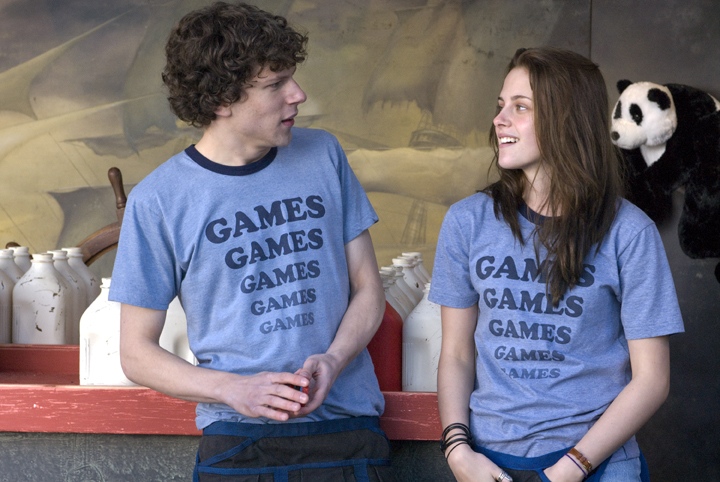
Tim Burton's ALICE IN WONDERLAND is as much "Alice in Wonderland" as James Whale's "Frankestein" is "Frankenstein," which is to say that the story is quite liberally adapted from its source material, almost to the point of requiring the phrase "loosely based on" in its press information. Here, there is no Duchess with a cook who uses too much pepper in the soup. The Mad Hatter is not obsessed with time or a clean tea cup. No Gryphon, no Mock Turtle. No Lobster Quadrille. And, most sadly, no ridiculous trial where logic was bent, in the original Lewis Carroll story, to the point of insanity.
Perhaps the biggest flaw in Burton's ALICE IN WONDERLAND is that his sequel-ish version of ALICE IN WONDERLAND is not crazy enough. In fact, it almost makes too much sense. Much worse, it becomes somewhat conventional, thanks to a script by Disney writer Linda Woolverton that builds the story toward an oft-telegraphed climax in which a reluctant, now-19-year-old Alice must put on Joan of Arc-like armor to battle the Jabberwocky, a character not from the original story but its sequel, "Through the Looking-Glass." This "Alice" actually favors "Looking-Glass" more heavily than "Alice in Wonderland," which is fine. But it puts everything in simple order and builds the story to a traditional result. And, in the process, it kills some of the wonder in wonderland.
Burton's Wonderland pulls the Cheshire Cat, Caterpillar, Mad Hatter, Doormouse and Knave of Hearts from the first part of Carroll's story and mixes them with the Red and White Queens and Tweedledee and Tweedledum from "Looking-Glass." Here, there is no giant chess game, however. Instead, Alice is now 19 and about to be proposed to by a creepy and foppish red-headed aristocrat. A vision of the White Rabbit from her childhood dreams distracts her and sends her back down to Wonderland, where Alice finds out that there is little wonder. In fact, she even got the name wrong. Turns out, it's "Underland." And they've been waiting for Alice to return. That is, if she's the "right Alice." (This turns out to be the extent of the film's nonsense in the true spirit of the original story.)
Probably because of the fact that Burton's favorite collaborator, Johnny Depp, is under the mad hat, the Hatter takes on a much-elevated role in this story, protecting and assisting Alice in her journey toward battle. Depp is as interesting as ever here, but surprisingly downplays the level of insanity one might expect from his character. His Hatter is idiosyncratic, to be sure, but not quite daffy. There are even moments of downright sadness in Depp's portrayal, a gravity given to a character known for being a literary cyclone. A friend of mine told me that he read that a critic referred to this Mad Hatter as "Bozo the Clown with an eye infection." And yes, the visual is striking: it's Kabuki Carrot Top raids Charles Dickens' closet and Marilyn Manson's contact lens collection. Frankly, it's one of the many great visuals in the film, but visuals were, to me, the only things about the film that were great.
Tim Burton is often accused of being so focused on art direction and his visuals that true emotion and storytelling are sacrificed. I find it unfair to unilaterally lob such an accusation at him, though this film reminds me that the charge sticks more often than not. There is certainly no sympathy for any character here the likes of which we felt for Burton's Edward Scissorhands or even his Sweeney Todd, who's cold and bloody revenge was at least brought on by some stunning injustices. If we were to feel sorry for Alice for any reason, it doesn't work here. Sure, I didn't want her to marry the guy who proposes to her, but the whole notion of Alice as all grown-up to become a Victorian-era feminist didn't feel fresh to me, and it didn't work for me. In truth, Alice was in "Underland" because the story required her to be. Unlike Dorothy in "The Wizard of Oz," here you were left wondering exactly what Alice had to look forward to if she was able to return home. The film does find an answer to this, but barely.
As for the rest of ALICE IN WONDERLAND, I can say that the 3-D I saw it in did little to enhance the visuals. I've read that this is a result of the film being shot in 2-D and then converted. I think it's more because the last film I saw in 3-D was "Avatar."
Helena Bonham Carter is fine as the Red Queen, though the film continues the tradition of confusing that character with the Queen of Hearts as the two Carroll stories are blended together. She doesn't have many great lines, though. And that's another beef I have with this movie. While it was fun to look at, it wasn't fun at all. I can't think of a single one-liner or joke in the film. It's all stunning visual with a traditional hero's journey of a story arc, but no emotional pull and no humor, the macabre visual whimsy of Tim Burton notwithstanding.
On paper, having Tim Burton directing ALICE IN WONDERLAND feels as perfect as having him direct Sondheim's "Sweeney Todd," though I feel that film worked more successfully on all levels. ALICE is equally as gray as that musical, but needed more color. More humor. More wonder. I can't say that I ever got bored, but if Burton is to be accused for caring more about the look of the film than anything else, this is exhibit A.
2.5 out of 4


